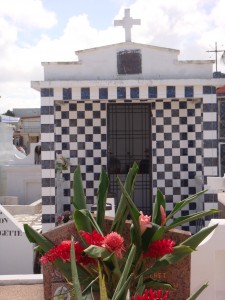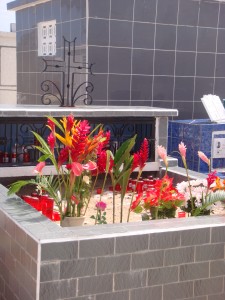In Guadeloupe, blogger Mycho has decided to resume her blogging activity for the occasion. Her short post highlights two important aspects of this celebration of the lost ones, which are the tradition and the family dimension:
Comme d'habitude, les Guadeloupéens vont illuminer les tombes. C'est toujours une occasion de se souvenir de ceux qui ne sont plus là, mais aussi de revoir ceux qui sont bien présents, mais que l'on n'a pas l'occasion de croiser bien souvent. Un moment de tristesse et de joie mêlées.
La collectivité régionale participe à l'opération à hauteur de 20 000 euros.
This is the presentation of the above-mentioned professional integration project:
Depuis samedi [1 novembre 2009], cinquante deux jeunes procèdent au nettoyage des tombes à l'abandon dans le Sud Basse-Terre et en Côte-sous-le-vent.
Domactu also posted about the traditional celebration of “la Toussaint” in Martinique:
Un moment qui rassemble toutes les générations pour honorer la mémoire de leurs morts.
However, in this post, we also learn that the tradition has changed gradually, since families tend to discharge the maintenance of their graves:
Mais c'est aussi l'occasion pour certains de se faire un peu d'argent. Tous les services sont donc bons à prendre.
Nettoyage de tombe, peinture, embellissement des caveaux sont autant de jobs que se partagent petits et grands…
Grave cleaning, painting, burial vault ornamentation are the casual jobs that young and even older handymen share…
For her part, Martinican blogger Imaniyé has decided to honor her ancestors by taking part in “An mémwa, Véyé Kont pour lézansèt” (Creole for “In memory of the ancestors, a storytelling evening”). Here is what she says about this cultural, historical and religious event:
En ces jours de Toussaint et de Fête des morts, pour la première fois, Amérindiens autochtones et Africains déportés sont honorés au cours de la même cérémonie. C’est très important. Pour les Amérindiens exterminés en 1658, comme pour les esclaves dont la dépouille git dans des cimetières inconnus, partout en Martinique. J’y participe. Je vous y invite.
In this very informative and well-documented post, Pyepimanla explores the celebration of “la Toussaint” among the descendants of the Indian immigrants in Guadeloupe as well as the impact of the recent trend of celebrating Halloween in the French West Indies. This last topic is fiercely debated in a post and comments on Bondamanjak.
From French Guiana, blogger Nuguet expresses his surprise at the fact that a guided tour of the cemetery of Cayenne on All Saints’ Day is actually a historical account of immigration and politics in French Guiana. He also had a chance to discover the almost festive spirit of this family celebration.
Finally, blogger Espas Ayisyen Toulouse, a Haitian expatriate in France, republishes a post about the dual celebration of “Toussaint” and “the Guédés” in Haiti:
Le premier jour de novembre est consacré à la fête de La Toussaint. Les fidèles catholiques vénèrent en cette occasion leurs saints et entretiennent la mémoire d’un membre cher de leur famille décédé.
[…]
La fête des Guédés, commémorée le 2 novembre, est typique de la religion vaudou en Haïti. Dans la mythologie du vaudou, les Guédés représentent les esprits de la Mort.
[…]
The celebration of the The Guédés on November 2nd, is typical of the voodoo religion in Haiti. In the voodoo mythology, the Guédés symbolize the spirits of the dead.
The bloggers from HN2000 also explain the dual celebration, but emphasize the fact that it is not unanimously accepted in Haiti:
En fait, encore une fois les fidèles catholiques et les vaudouisants vont pouvoir rendre nouvellement un hommage ou une nouvelle visite à leurs proches disparus. D’autre en plus, ils vont glorifier leurs dieux, un comportement sévèrement jugé par les protestants.








